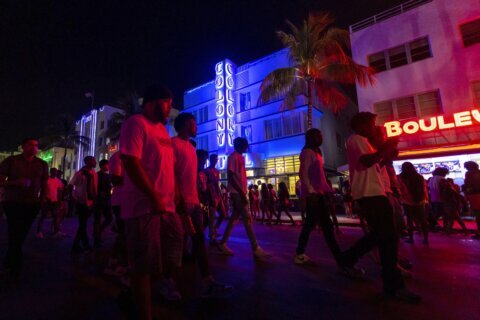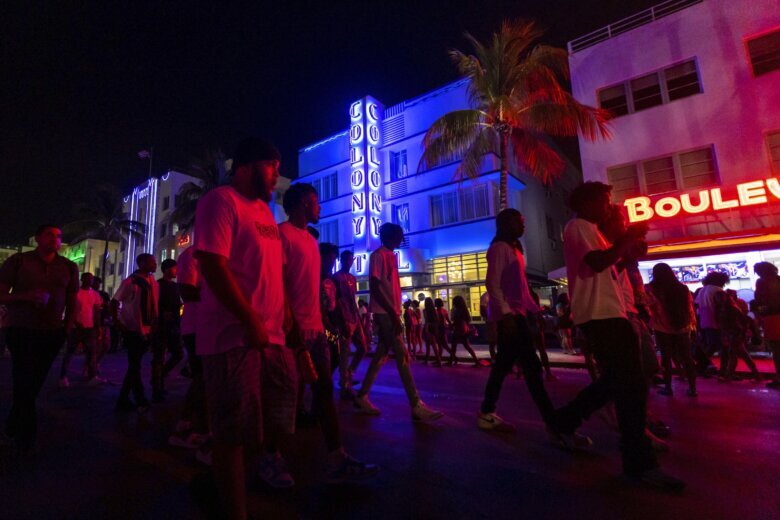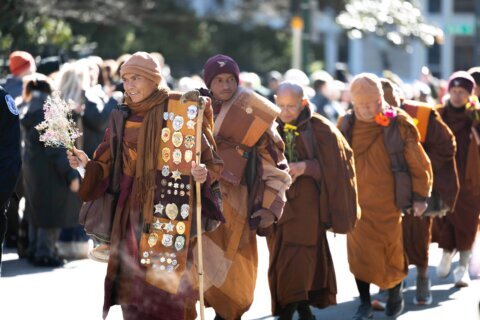
(CNN) — Miami Beach may be breaking up with spring break, but spring break isn’t moving on just yet. It’s a complicated, sometimes toxic, affair.
City officials and business owners have had to balance the billions of dollars generated by visitors during the annual ritual with successive years of unruly crowds and spring break violence. Two fatal shootings in 2023 led to a state of emergency and a midnight curfew in the popular destination for partying college students.
Last week, Florida Gov. Ron DeSantis announced he was dispatching 140 state troopers throughout the Sunshine State – 45 of them in Miami Beach – to keep raucous spring breakers in check.
The tough love comes amid a City of Miami Beach breakup campaign that includes hefty fines, curfews, bag checks, restricted beach access, DUI checkpoints, $100 parking fees and nonresident towing rates of more than $500.
“This isn’t working anymore,” a young actor says in a viral YouTube video announcing the “breaking up” campaign. “And it’s not us. It’s you. We just want different things.”
For David Wallack, the owner of Mango’s Tropical Cafe in South Beach, a breaking point in the long love-hate relationship came after a series of stampedes last March.
“That was like the final straw for me,” Wallack said.
The mayhem unfolded outside Mango’s, which was packed inside and out with diners and revelers. Overlooking the beach, the restaurant/club is one of Miami Beach’s better-known nightspots, an Ocean Drive institution for more than 30 years.
Wallack said there were multiple stampedes in the area last spring. The mad rush can be sparked by a fight, a scream, a firecracker and, of course, a gunshot, he said.
“Hundreds and hundreds of people running in panic,” Wallack recalled. “Tables and chairs go flying. People have to run for their lives.”
He contemplated shutting down his establishment. “But time and months and months soften you. So you become hopeful again.”
‘We hope it’s an amicable separation’
On a visit to Miami Beach on Tuesday, the Republican governor stood with Miami Beach Mayor Steven Meiner to announce the deployment of state troopers to enhance security.
“Florida is a very welcoming state. We welcome people to come and have a good time. What we don’t welcome is criminal activity. What we don’t welcome is mayhem and people that want to wreak havoc on our communities,” DeSantis told reporters.
“Make no mistake about it: If you’re coming here in order to enjoy Florida and have a good time, fine. If you’re coming for these other reasons, if you’re committing crimes, causing havoc, you are going to pay the price and we will hold you accountable.”
The troopers will assist multiple local law enforcement agencies, and a rapid-response team of 24 troopers will be on standby in the state’s most popular spring break destinations – Panama City, Daytona Beach, Fort Lauderdale and Miami/Miami Beach.
The troopers will help with crowd control, DUI checkpoints, license plate readers and directing traffic.
“We’ve had enough,” Meiner told reporters.
The Miami City Commission last month approved a series of measures to enhance public safety during spring break, including security checkpoints at beach entrances, more DUI inspections and a greater presence of law enforcement from Miami and other jurisdictions.
“Every police officer in the Miami Beach Police Department will be working a minimum of 13 hours and some as much as 16 hours per day during spring break,” Chief Wayne Jones told CNN.
“More police than ever before. More restrictions than ever before,” he said. “The idea is not to ruin the fun for kids coming down for spring break. The idea is to keep people safe.”
On March 17 last year, a Friday, violence erupted in South Beach amid both St. Patrick’s Day festivities and spring break partying, leaving one person dead and another injured, according to authorities. Four firearms were recovered, police said.
Later that same weekend, Miami Beach police said, another person was fatally shot and another injured, prompting city officials to issue a state of emergency and a midnight curfew.
In 2022, the City of Miami Beach similarly imposed a midnight curfew after two spring break shootings left five people injured on Ocean Drive.
“We’re a very small city. The biggest issue for spring break is simple capacity. We are bursting at the seam,” Jones said. “In order to control that you have to mitigate the amount of people coming here during spring break. That’s why … we’re breaking up with spring break. We hope it’s an amicable separation. We want people to have a good time. We really don’t want them not to play by our rules.”
Nearly half of the people arrested during spring break each year are from South Florida, said Jones, who joined the police department in 1996 and rose through the ranks.
Asked about criticism in some quarters that the spring break crackdown unfairly targeted Black Floridians, the city’s first Black police chief said: “As a Black man, I’m hypersensitive to that.”
“As a teenager … my dad discouraged me from coming to Miami Beach because of the impression that Black young men weren’t treated well here,” he said. “We’re in the business of policing behavior, not race or ethnicity.”
‘Never mind, we shouldn’t go there’
The City of Miami Beach sits on a small barrier island between Biscayne Bay and the Atlantic Ocean. Much of the spring break revelry happens along 10 sun-splashed blocks of art deco hotels, trendy restaurants and nightspots on Ocean Drive.
Katie Ryan, a spring breaker from Connecticut, arrived in Miami Beach with friends on Monday. She was sunbathing on a quiet stretch of beach the other day. The area seemed tame, she said, compared to previous “crazy” spring break stays in Fort Lauderdale, about 35 miles north.
“I saw the videos before coming here about how crazy it was going to be, so maybe people were like, ‘Never mind, we shouldn’t go there,’” Ryan said.
Her friend, Avery Caimes, marveled at how tranquil the beach seemed just a day before the usually busy second weekend of spring break. “There is plenty of space. It’s not loud,” she said.
Mark Evenson, a spring breaker from Minnesota, said he had “mixed feelings” about the efforts to tone down the partying.
“I’m here enjoying kind of what they are trying to stop from happening, but I understand why they’re doing it,” he said of local authorities. “For the most part, I think everyone here is just trying to have some fun.”
Outside Mango’s, Wallack said sidewalk seating on his stretch of Ocean Drive will be shut down on weekends under the spring break restrictions – meaning about a 30% cut in profits for businesses with cafes.
“If they curfew and we have no nightclub … what are we left with? A whole lot of salaries and a kitchen,” he said. “If it’s anything like it’s been the last few years, it’s very, very bad for business.”
The-CNN-Wire
™ & © 2024 Cable News Network, Inc., a Warner Bros. Discovery Company. All rights reserved.








